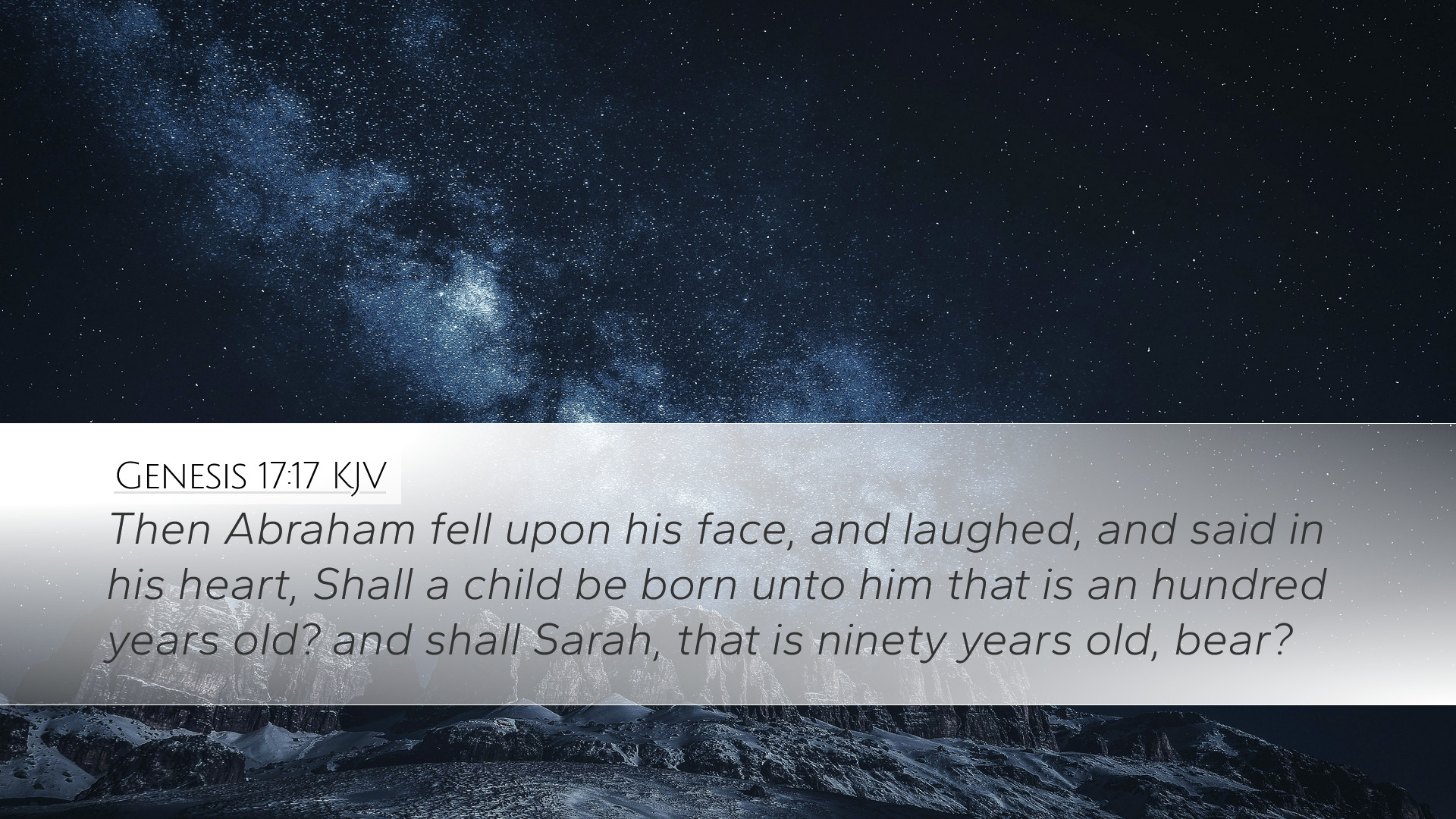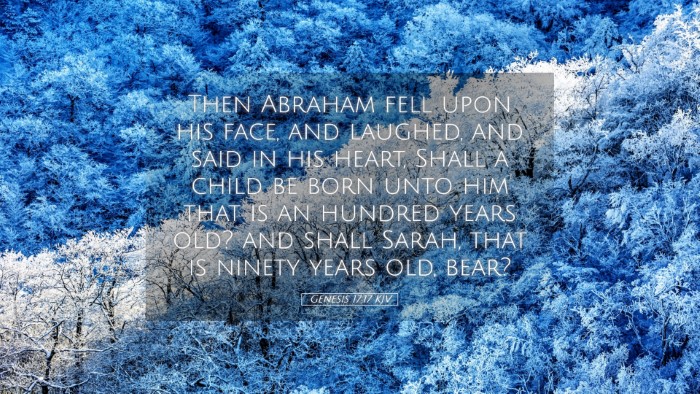Commentary on Genesis 17:17
Genesis 17:17 states: "Then Abraham fell upon his face, and laughed, and said in his heart, Shall a child be born unto him that is an hundred years old? and shall Sarah, that is ninety years old, bear?" This verse captures a significant moment in the covenant promise made by God to Abraham regarding the birth of Isaac. It illustrates Abraham's response—both of humility and disbelief—when confronted with the impossible nature of God's promise. Below, insights are gathered from several public domain commentaries.
1. Contextual Overview
To fully grasp the weight of Abraham's reaction, it's necessary to consider the broader context of Genesis 17. At this point in the narrative, God establishes a new covenant with Abram (later named Abraham), a covenant that will be marked by the promise of land, descendants, and blessings. This particular section focuses on the specific promise of a son to Abraham and Sarah.
2. Analysis of Abraham's Reaction
Abraham’s laughter is multifaceted, revealing both a heart of faith and human limitation. It showcases the tension between divine promise and human skepticism. The commentaries bring forth several insights:
- Matthew Henry: He suggests that Abraham's laughter, while seemingly one of disbelief, also embodies a complex reaction of joy mixed with incredulity. Henry posits that this laughter reflects a recognition of God’s omnipotent capability contrasted by human inability.
- Albert Barnes: Barnes elaborates on the nature of Abraham's faith, indicating that laughter can reflect wonder and astonishment at God’s grace rather than mere doubt. This aligns with the Hebrew understanding of laughter, which can express joy and celebration, as seen later in Isaac's name meaning "laughter."
- Adam Clarke: Clarke delves into the cultural implications, noting that in that ancient context, the birth of a child at such an advanced age would have seemed utterly outlandish. He highlights Abraham's humanity and the natural inclination towards skepticism when faced with the divine.
3. The Significance of "Fell Upon His Face"
The act of falling upon his face is a gesture of profound reverence. This non-verbal communication illustrates Abraham’s position before God—trembling yet holding a deep respect for the divine. Commentaries reflect on this posture:
- Matthew Henry: He emphasizes that this posture signifies submission and worship. Before receiving such profound promises, Abraham’s act of humility sets the tone for the gravity of the covenant being made.
- Albert Barnes: Barnes underscores that such a response reflects Abraham's recognition of his own insignificance in light of God’s glory and power. Falling to the ground suggests understanding one’s limitations.
4. Implications for Faith and Promise
Abraham's laughter leads to an essential reflection on the nature of faith. The promise made by God challenges believers to trust in His plans, even when they seem impossible by human standards:
- Matthew Henry: He asserts that God delights in fulfilling His promises in ways that defy human logic and expectation, inviting believers to embrace faith that transcends understanding.
- Albert Barnes: Barnes notes that skepticism in the face of divine promise can be transformed into faith. This moment in Abraham’s life speaks to believers about the journey of faith where doubt gradually gives way to trust.
- Adam Clarke: Clarke teaches that this episode serves as an admonition for later generations about the importance of unwavering faith, even at times of apparent absurdity.
5. Laughter in the Biblical Narrative
The theme of laughter continues throughout the Bible, particularly linked to God's promises:
- Matthew Henry: He connects Abraham's laughter to the later joy experienced at Isaac's birth. He presents laughter as a motif of hope, replete with divine fulfillment.
- Albert Barnes: Barnes reflects on the joyous irony that Abraham would become the father of many nations and that through Isaac, the covenant promises would flourish.
- Adam Clarke: Clarke suggests understanding laughter as a precursor to joy and fulfillment, prompting a deeper exploration of God’s blessings that follow faithfulness.
6. Conclusion: Walking in Faith
The illustration of Abraham in Genesis 17:17 calls believers to a dual engagement of humility and faith. His laughter, a blend of disbelief and joyous anticipation, serves to remind us of our human limitations contrasted with God’s infinite possibilities.
Thus, this verse encourages pastors, students, theologians, and Bible scholars to delve into the laughter of faith—the invitation to trust deeply in the One who transcends our limitations, presenting us with promises that fulfill the deepest desires of our hearts and the intentions of God’s providence.


